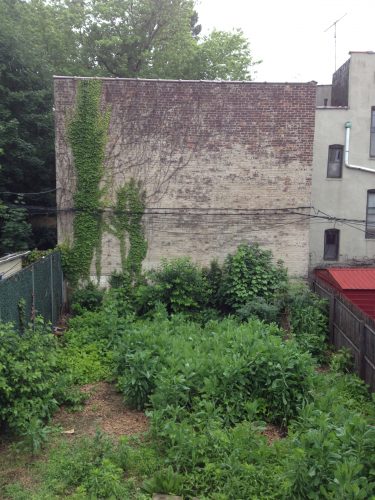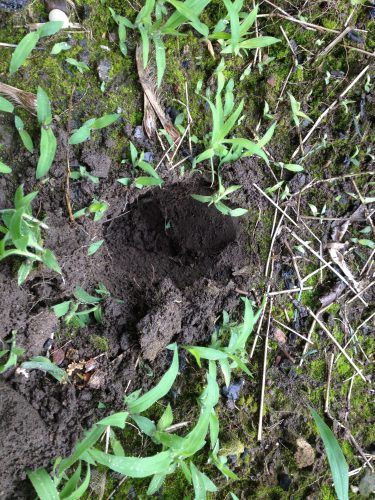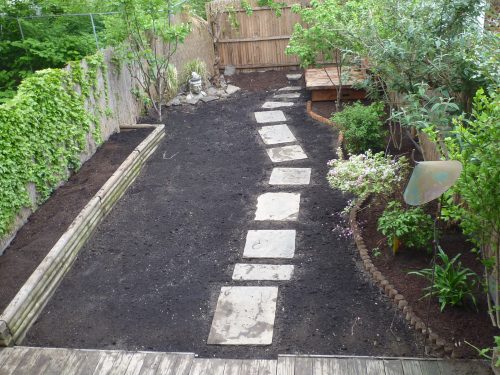
Many Brooklyn homeowners have inherited a common problem: contaminated backyards. This is a result of over 100 years of garbage incineration, car fumes and toxic paint. In New York, soil is deemed contaminated if there are more than 400 ppm of lead present in the soil (in Euro the maximum is 100ppm!).
A few months ago, Eco Brooklyn wrote a blog about soil tests and remediation jobs they have done. The results from the soil analysis were staggering…the Eco Brooklyn Showhouse backyard had 3,500 ppm of lead!
Lead, and other heavy metal contaminated can be very harmful to health. Especially children.
There are the few steps you can take to test your own backyard!
A soil test is an analysis of a soil sample to determine the content of nutrient, contaminates, composition, acidity and other characteristics of the soil. Contaminate elements usually include arsenic, barium, cadium, copper, mercury and lead. By performing a soil test we are attempting to indicate the deficiencies that need to be remedied and the toxicities from excessive fertility.
How to test your soil for contaminates:

Method for Garden Soil Sampling
- Use a spade or trowel and take samples of soil from 10 or more random locations distributed throughout your area of interest. Place all the sampled into a clean container. For small areas, a minimum of 3 samples is recommended.
- Grass-Sampling depth should be the top 3-4 inches deep
- For other plants, the sampling depth should be the top 6-8 inches.
- Mix up the container and remove pebbles, leaves and plant roots. Transfer at least one cup of the soil into a .5 lb plastic bag and seal it. Try not to fill the entire bag because it will be flattened in the mail.
- Place the plastic in a mailing envelope or a small box. If the samples are wet, dry them at room temperature. Drying the soil by using a stove or radiator may change the readings.
Costs:
-
- Lead Test – $10.00
- Heavy Metal Test – $35.00
- Basic Soil Quality Test – $45.00
- Soil samples are screened for (1) pH, (2) salt content, (3) soil class using jar test, (4) NPK levels using field kits, and (5) lead, chromium and zinc using XRF analyzer. Results available within one week.
- Soil samples are analyzed for (1) total organic content, (2) nitrate, phosphate, ammonia contents, (3) potassium and micro-nutrients with modified Morgan extraction method, (4) soil class using hydrometer method, and (5) heavy metals using wet digestion-ICP-MS method.
- Five toxic metals (Pb, Cr, As, Cd and Ni) are analyzed for plant tissue samples with acid digestion ICP-MS method. Please note that these samples cannot be sent through mail (i.e., must be dropped off in person). Results available 2-4 weeks.
-
- Advanced Soil Quality Test – $75.00
-
- Tissue Analysis: Heavy Metals in Vegetables, Fruits and Herbs – $30.00
You can conveniently send your soil to the testing lab at Brooklyn College. Dr. Cheug, a Professor of Earth science and soil analyst has upgraded his techniques so that the process only takes an hour!
What do you do if your soil is contaminated?

There are two different routes that you can take. The first is to depend on the power to plants to do most of the remediation. Ideally you would use plants that are not used for food or medicine.
After the plants have grown and absorbed the contaminates, the plants need to be removed from the contaminated area. This process would have to occur multiple times over a few years.
The second possible route is a complete soil remediation, where a company, such as Eco Brooklyn comes in and removes the top 6-8 inches of soil, places a barrier down and then covers the void with new soil. There is potential for contamination as the workers walk through the house creating opportunities for contaminates to be brought into the house.
Eco Brooklyn recommends that a complete soil remediation is the best way to react to soil contamination. Although there is a potential to contaminate a home, we believe that with our careful procedure, the results are safer and more effective.
